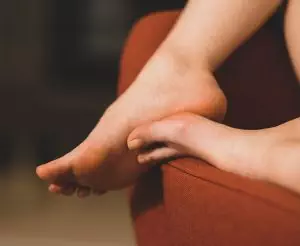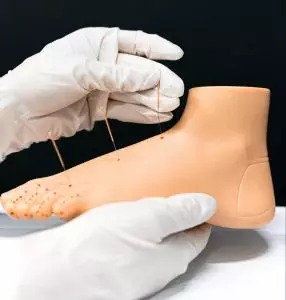By Qineng Tan, L.Ac., Ph.D. & Xiaomei Cai, L.Ac., Ph.D.

Do you feel like there is a pebble in your shoe all the time? Burning, tingling ball of foot pain? Tenderness between the 3rd and 4th toes? These could be symptoms of Morton’s Neuroma, a condition in which inflammation and swelling around a nerve in the ball of the foot causes toe pain and numbness. Acupuncture and Chinese medicine can help relieve Morton’s Neuroma foot pain.
Morton’s Neuroma is a problem related to swelling and thickening of tissue around a nerve in the foot. This nerve runs under the ligaments that connect the toe bones to the bones of the foot. A neuroma is considered to be a kind of benign tumor or growth and is usually not large enough to feel as an actual lump on the bottom of the foot.
Pain in the forefoot, or ball of foot pain, can be a sign of Morton’s Neuroma, or it could be a symptom of one of several other conditions, including:
- Metatarsalgia – a general term for pain and inflammation in the ball of foot, around the metatarsals. Pain symptoms can be similar to those of Morton’s Neuroma
- Capsulitis – irritation of the capsular ligaments in the foot can cause pain in the ball of the foot that comes and goes
- Gout – a type of arthritis in the foot or toes, caused by a buildup of uric acid
- Rheumatoid Arthritis (RA) – an autoimmune condition that causes arthritic pain that usually begins in the extremities
- Bunion pain – a bony bump that develops on the outside of the big toe joint
- Edema – swelling caused by fluid trapped in the tissues of the foot
- Arthritis – a general term for joint pain, which can affect the toes and feet
- Fractured bones in foot
- Bursitis – bursas are small sacs that act as cushioning for joints; there are bursae around the metatarsals that can become inflamed, causing ball of foot pain
- Tarsal Tunnel Syndrome – a condition where the tibial nerve is compressed in the tarsal tunnel area of the ankle, causing pain and tingling in the foot
- Radiculopathy – compression of a nerve in the lower back can cause pain in the foot, similar to sciatica
- Hammertoe – when one of the toes becomes bent, usually due to pinching shoes, and the muscles and ligaments can’t straighten it, causing swelling and pain
- Diabetes – foot pain and numbness (diabetic neuropathy) can happen due to diabetes.
It is possible for a person to have one of the conditions listed above, and also have a Morton’s Neuroma; sometimes another foot problem can contribute to the development of a neuroma.
Morton’s Neuroma Symptoms
The signs of a Morton’s Neuroma include:
- Ball of foot pain, especially when you put weight on in
- Toe pain or pain between the toes
- Numbness or tingling in the ball of the foot, “pins and needles” sensation
- Swelling between toes or in the ball of the foot
- Pain is better with rest, staying off of your foot
People often describe the sensation as feeling like there’s a pebble in your shoe or a wrinkle in your sock that is irritating, particularly in the area between the third and fourth toes.
Typically, the symptoms of neuroma begin to be noticeable when you are either engaging in an activity that aggravates the nerve, like running or playing a high-impact sport like tennis, or wearing shoes that force the ball of your foot to take extra impact. The pain and tingling may get better when you finish, take off your shoes, and rub your foot.
Over time, though, as the neuroma gets bigger, the pain may get worse and more persistent. If Morton’s Neuroma is left untreated, it can cause permanent damage to the nerve.
What Causes Morton’s Neuroma?

Morton’s Neuroma occurs due to compression of the nerve in the foot that carries sensory signals from the toes. Some people may be more prone to developing Morton’s Neuroma due to the shape of their foot, such as having an unusually high arch, or a very flat foot.
The way that the foot hits the ground and leaves the ground while walking or running can cause a lot of impact and stress to the ball of the foot. An injury to the foot or toes, or other type of trauma, can trigger this nerve condition, as can repetitive stress from a particular sport or other activity. Wearing high heels, flip-flops, or shoes that pinch the toes together can be a factor.
Morton’s Neuroma Treatment
A foot specialist, or podiatrist, will diagnose Morton’s Neuroma by feeling the ball of the foot to see if there is a noticeable mass and to sense what the pain and tingling symptoms are like for the patient. An ultrasound or MRI can show a soft tissue mass like a neuroma, and may be used to confirm the diagnosis.
Usually the first recommendations for a person with Morton’s Neuroma will be to change their footwear: choosing roomier shoes and softer, padded socks, etc. Orthotic supports may be prescribed.
Steroid injections may be used to relieve pain and swelling. If these measures do not help, surgery for Morton’s Neuroma can either be to cut ligaments and other nearby tissues to try to relieve pressure, or in some cases, the affected nerve itself may be removed (neurectomy). This can relieve pain; it can also reduce sensation in the foot permanently. There is also a chance with some surgeries that the neuroma may simply grow again.
Neuromas do not generally go away on their own. The most conservative treatment options for Morton’s Neuroma—like rest, icing, and different shoes—may or may not help to relieve the pain and tingling. Fortunately, acupuncture treatment is an excellent way to help relieve nerve pain.
Can Acupuncture Help Morton’s Neuroma Foot Pain?

Inflammation and compression around nerves can cause nerve pain in many different parts of the body. For example, pinched or compressed nerves in the spine, or a herniated disc, can cause sciatica or piriformis syndrome: hip pain or pain that radiates down the leg. Compression of the plantar nerve can cause heel pain. A pinched nerve in the neck can cause shoulder pain and/or neck pain. Impingement of the median nerve causes carpal tunnel syndrome. An inflamed trigeminal nerve causes pain in the face. With acupuncture, we are able to provide treatments that can help relieve all of these types of nerve pain.
Acupuncture and other Chinese medicine modalities can help to reduce inflammation that presses on nerves, release scar tissue, and help to heal nerves and the irritated soft tissues surrounding them, like ligaments and muscles. Acupuncture also acts as an analgesic, reducing pain and increasing endorphins.
Evidence suggests that the stimulation of acupuncture points encourages the pituitary gland to release more cortisol, which plays an important role in reducing inflammation. It has been hypothesized that acupuncture influences the release of neuropeptides from nerve endings, which is also a key part of the inflammatory response.
According to TCM theory, this type of pain is often considered to arise due to “Bi Syndrome” conditions, in which stagnation of Qi and blood causes stiffness. The blockage of energy usually occurs due to pathogenic forces of “wind,” “cold,” or “dampness,” or some combination of these factors. Thus, the acupuncture practitioner will choose from a variety of methods including acupuncture, herbal supplements, moxibustion, and Tuina massage to clear obstructions that lead to pain and numbness, such as with Morton’s Neuroma.
Acupuncture Near Me for Morton’s Neuroma, Los Angeles Area
There are many different conditions that can cause foot pain and toe pain. It is important to seek care for foot problems promptly, so that they do not become worse. Acupuncture and other TCM treatments can help improve and maintain foot health for everyone, and can help manage and relieve many types of injury or disorders that affect the feet. At Art of Wellness near Santa Monica, we have 30 years of experience helping people stay active and on their toes.
*This article is for education from the perspective of Traditional Chinese Medicine only. The education provided by this article is not approved by FDA to diagnose, prevent, treat and cure human diseases. It should not stop you from consulting with your physician for your medical conditions. Traditional Chinese Medicine is based on Qi, which is an invisible force that usually cannot be observed by modern science. Because science focuses on testing ideas about the natural world with evidence obtained through observation, these aspects of acupuncture can’t be studied by science. Therefore acupuncture and Chinese herbs are often not supported by double-blind, randomized trials, and they are considered alternative medicine therapies in the United States.
